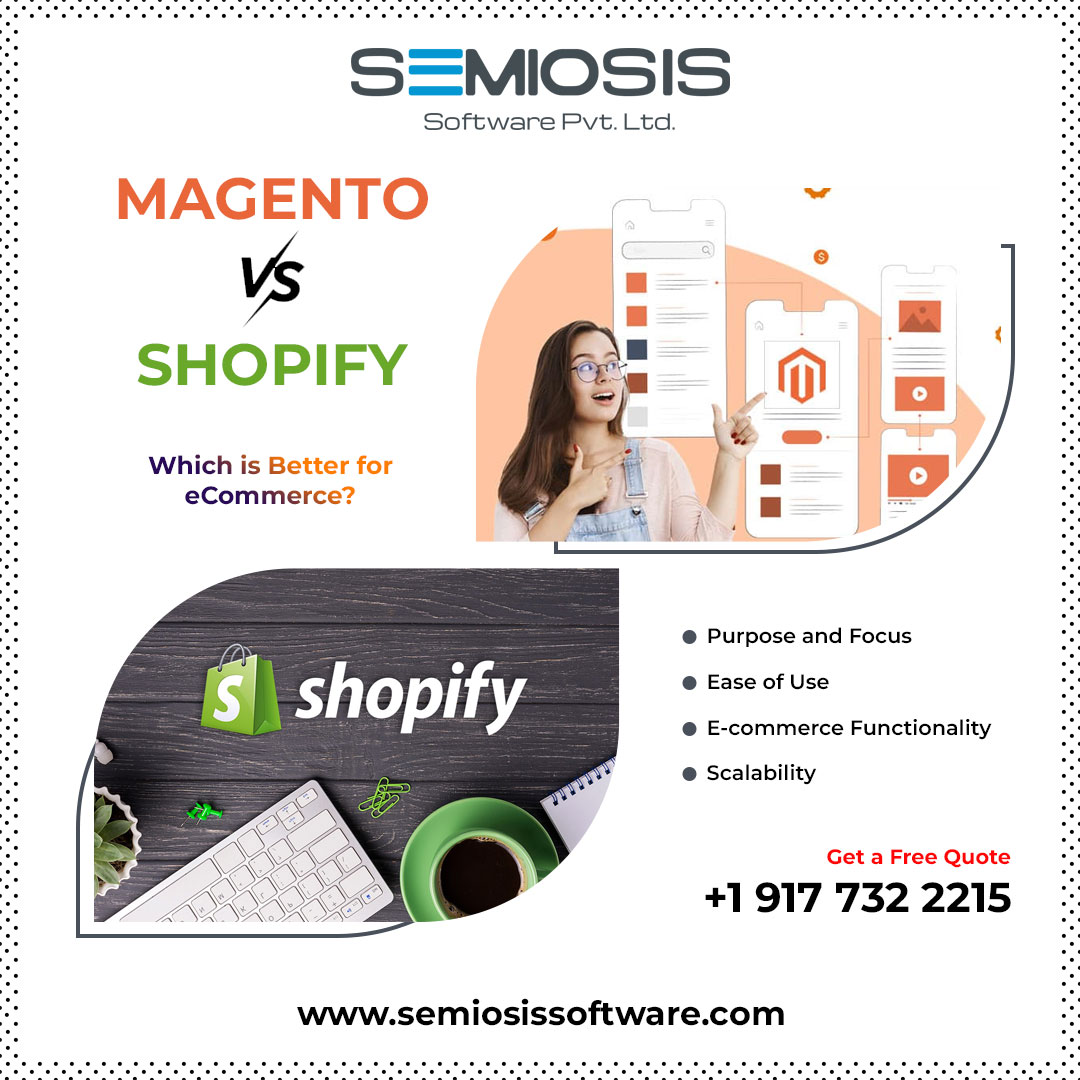Magento vs Shopify: Choosing the Right E-commerce Platform
In the bustling world of e-commerce, selecting the right platform can make all the difference. Among the myriad options available, Magento vs Shopify stand out as two prominent contenders. Each platform comes with its own set of features, strengths, and weaknesses, making the decision-making process challenging for entrepreneurs and businesses alike. So, let’s dive into the comparison of Magento VS Shopify to help you determine which one suits your e-commerce needs better.
Magento: The Powerhouse of Customization – Magento VS Shopify
Magento, acquired by Adobe in 2018, is an open-source e-commerce platform known for its robustness and flexibility. It caters to businesses of all sizes, from startups to enterprise-level companies. Here’s a breakdown of its key features:
-
Customization: Magento offers extensive customization options, allowing users to tailor their online stores to meet specific requirements. With access to the platform’s source code, developers can modify and extend functionalities to suit the business’s unique needs.
-
Scalability: As businesses grow, scalability becomes crucial. Magento excels in this aspect, providing the scalability needed to accommodate increasing product catalogs, traffic volumes, and transactions.
- Advanced Features: From advanced product management to multi-store capabilities, Magento boasts a wide array of features essential for complex e-commerce operations. It supports various payment gateways, shipping methods, and third-party integrations, enabling businesses to create fully functional online stores.
-
Cost: While Magento itself is open-source and free to use, building and maintaining a Magento store can be costly. Expenses may include hosting, development, extensions, and ongoing support, especially for larger enterprises requiring extensive customization.
Shopify: Simplicity and Accessibility – Magento VS Shopify
Shopify has emerged as a popular choice for e-commerce entrepreneurs seeking a user-friendly platform that requires minimal technical expertise. Here’s what sets Shopify apart:
-
Ease of Use: Shopify’s intuitive interface makes it easy for beginners to set up and manage their online stores without extensive technical knowledge. Its drag-and-drop editor simplifies the process of customizing store layouts and designs.
-
Hosted Solution: Unlike Magento, Shopify is a fully hosted solution, meaning it handles all the technical aspects of hosting, security, and maintenance. This alleviates the burden on businesses, allowing them to focus on sales and growth.
- App Store: Shopify’s extensive app store offers a wide range of plugins and extensions to enhance store functionality. From marketing tools to inventory management systems, users can find solutions to streamline various aspects of their e-commerce operations.
-
Cost-Effectiveness: While Shopify involves monthly subscription fees, its pricing plans are transparent and inclusive of hosting and support. This makes it a cost-effective option, particularly for small and medium-sized businesses with limited budgets.
Best Magento Development Company – Magento VS Shopify
Semiosis Software stands out as a top-tier Magento development company, renowned for its expertise in crafting bespoke e-commerce solutions. With a focus on innovation and client satisfaction, Semiosis Software delivers unparalleled Magento services, ranging from custom theme development to robust extension integration. Their team of seasoned developers excels in leveraging Magento’s advanced features to create immersive online shopping experiences tailored to each client’s unique requirements. Through meticulous attention to detail and a commitment to excellence, Semiosis Software consistently exceeds expectations, earning recognition as a trusted partner in driving e-commerce success.
Best Shopify Development Company – Magento VS Shopify
Semiosis Software emerges as a premier Shopify development company, revered for its proficiency in shaping cutting-edge e-commerce solutions. With a dedication to innovation and client-centricity, Semiosis Software delivers exceptional Shopify services, spanning from captivating store design to seamless app integration. Their adept team of developers specializes in harnessing Shopify’s robust features to craft engaging online shopping experiences tailored to individual client needs. Through meticulous craftsmanship and unwavering commitment, Semiosis Software consistently surpasses expectations, establishing itself as a reliable ally in propelling e-commerce ventures to unprecedented heights.
Choosing the Right Platform – Magento VS Shopify
The decision between Magento VS Shopify ultimately boils down to your specific business requirements, budget, and long-term goals. Here are some factors to consider:
-
Complexity: If you require extensive customization and scalability for a large-scale e-commerce operation, Magento may be the better choice. However, if simplicity and ease of use are paramount, Shopify might be more suitable.
- Budget: Consider both upfront and ongoing costs associated with each platform. While Magento offers flexibility in terms of customization, it can be more expensive to set up and maintain compared to Shopify’s all-inclusive pricing.
- Technical Expertise: Assess your team’s technical skills and resources. Magento requires development expertise to leverage its full potential, whereas Shopify’s user-friendly interface caters to those with limited technical knowledge.
-
Future Growth: Anticipate your business’s growth trajectory and scalability requirements. Magento’s robustness makes it ideal for long-term expansion plans, whereas Shopify provides a simpler, more accessible option for quick startup launches.
Conclusion – Magento VS Shopify
Both Magento VS Shopify have their strengths and weaknesses, making them suitable for different types of e-commerce ventures. By carefully evaluating your needs and priorities, you can make an informed decision that aligns with your business goals. Whether you opt for the flexibility of Magento or the simplicity of Shopify, remember that success in e-commerce ultimately depends on delivering exceptional products and experiences to your customers.






